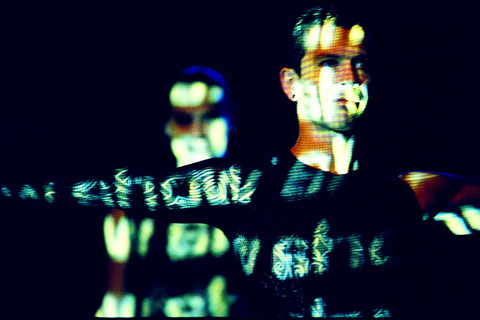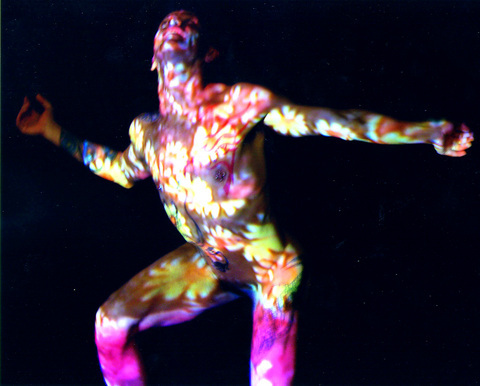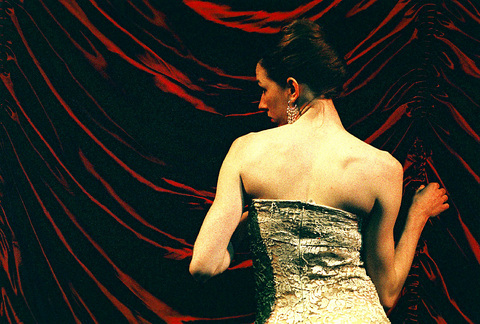A dance company that doesn't want to be thought of as a dance company, a company that reinvents itself for each new work and thrives on making its audience feel uncomfortable, individual dancers who challenge the very definition of what it means to dance. It's hard to still be a rebel when you're almost 20 years old, but the UK-based DV8 Physical Theatre -- and its director Lloyd Newson? -- remain determined to try.
The Australian-born Newson and a group of dancers who were disillusioned with the dance world and where modern dance appeared to be going, formed DV8 in 1986. The aim was to do and be something different. By mixing dance and video -- and addressing social issues of the day -- the company aimed not just to shake up society, but hopefully change it as well.
Nowadays, groups that mix dance and other media have become commonplace. The Brussels-based dance troupe Ultima Vez and the Nederlands Dance Theater have both brought productions to Taipei that cleverly integrated video and film with choreography and had dancers who talked directly to the audience. Yet DV8 continues to set new standards and to force audiences to rethink what dance is, even if Newson himself has been quoted as saying that he is reluctant to use the term "physical theater" these days.

PHOTOS COUTESY OF DV8 PHYSICAL THEATRE
The company doesn't have a repertoire or corp of dancers. The company averages around eight dancers per piece, although it expanded more than 20 for its last project Can We Afford This (also known as The High Cost of Living. The dancers are hired specifically for each project.
Newson is also interested in redefining what audiences expect a dancer to be, and he certainly did with his last production, which featured a dancer without legs and a 70-year old woman.
In previous productions such as Can We Afford This, Achilles, Bound to Please and Dead Dreams of Monochrome Men, DV8 has tackled the battle for perfectionism, masculinity, AIDS, drugs, sexuality, abuse and other controversial topics.

The aim to take risks, push the boundaries, break down the barriers that separate performers from their audience and to shock people out of their complacency, and year after year, DV8 has delivered. This is, after all the company whose list of press reviews includes the line from The Scotsman: "You could have heard a pin drop were it not for the sound of air being sucked through clenched teeth."
So what can Taipei audiences expect?
In the 75-minute long Just for Show, the seven members of the company explore the importance of appearance and image in today's world through a blending of three-dimensional and two-dimensional video projections, choreography and text.

"With the three-dimensional, dancers can dance with it, be behind it, walk through it," Newson said at a press conference yesterday.
"The most important thing is that the visuals are only an element of the show. We didn't want the technology to overwhelm the show," he said.
"The theme of the show is about illusion -- what is real, what is not, what are lies, what are truths," he said.
What does it means, the company asks, to live in a world where looking good has superseded being good and where faking it has become synonymous with making it? What happens to those who don't fit in?
Newson said the issue of exclusion has been a key theme of his work.
The mix of psychological probing and choreography goes back decades with Newson. He became interested in dance while working on a degree in psychology, though he eventually ended up doing a degree in social work, with a focus on therapy. He said he turned to dance classes to keep his life in balance. He landed a scholarship to London Contemporary Dance School and he later became a dancer and choreographer with Extemporary Dance Theatre, performing with them for five years.
"I deal with the little things that confront my life," Newson said. "I'm also interested in the issues of tolerance and intolerance." Those issues have hit a chord with audiences around the world, judging from the rave reviews that DV8 has received for many years.
Just for Show comes with the caveats that the performance includes nudity, strong language and scenes that some may find offensive.
For your information :
What: DV8 -- Just for Show
Where: CKS Cultural Center, National Theatre (
When: Tonight and tomorrow at 7:30pm, Sunday at 2:30pm and 7:30pm. The Sunday evening show was added to accommodate people who had bought tickets for the initial three shows but their seats were on the sides with what would be obstructed views.
Additional info: The show runs 75 minutes without and intermission and the theater says there will be no admittance for latecomers.

June 9 to June 15 A photo of two men riding trendy high-wheel Penny-Farthing bicycles past a Qing Dynasty gate aptly captures the essence of Taipei in 1897 — a newly colonized city on the cusp of great change. The Japanese began making significant modifications to the cityscape in 1899, tearing down Qing-era structures, widening boulevards and installing Western-style infrastructure and buildings. The photographer, Minosuke Imamura, only spent a year in Taiwan as a cartographer for the governor-general’s office, but he left behind a treasure trove of 130 images showing life at the onset of Japanese rule, spanning July 1897 to

One of the most important gripes that Taiwanese have about the Democratic Progressive Party (DPP) is that it has failed to deliver concretely on higher wages, housing prices and other bread-and-butter issues. The parallel complaint is that the DPP cares only about glamor issues, such as removing markers of Chinese Nationalist Party (KMT) colonialism by renaming them, or what the KMT codes as “de-Sinification.” Once again, as a critical election looms, the DPP is presenting evidence for that charge. The KMT was quick to jump on the recent proposal of the Ministry of the Interior (MOI) to rename roads that symbolize

On the evening of June 1, Control Yuan Secretary-General Lee Chun-yi (李俊俋) apologized and resigned in disgrace. His crime was instructing his driver to use a Control Yuan vehicle to transport his dog to a pet grooming salon. The Control Yuan is the government branch that investigates, audits and impeaches government officials for, among other things, misuse of government funds, so his misuse of a government vehicle was highly inappropriate. If this story were told to anyone living in the golden era of swaggering gangsters, flashy nouveau riche businessmen, and corrupt “black gold” politics of the 1980s and 1990s, they would have laughed.

It was just before 6am on a sunny November morning and I could hardly contain my excitement as I arrived at the wharf where I would catch the boat to one of Penghu’s most difficult-to-access islands, a trip that had been on my list for nearly a decade. Little did I know, my dream would soon be crushed. Unsure about which boat was heading to Huayu (花嶼), I found someone who appeared to be a local and asked if this was the right place to wait. “Oh, the boat to Huayu’s been canceled today,” she told me. I couldn’t believe my ears. Surely,